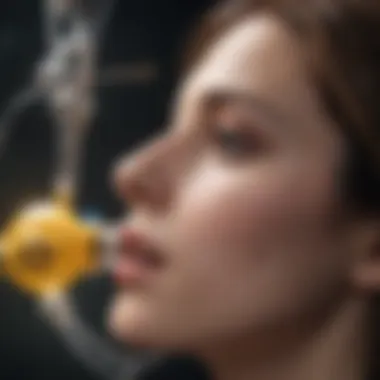Anesthesia and Depression: Exploring Their Connection


Intro
The interplay between anesthesia and mental health, particularly depression, is a topic that begs for deeper exploration. Having undergone surgery, one may not immediately consider how the drugs used can affect their emotional state post-procedure. Yet, the connection is significant and multifaceted. This article embarks on a thorough evaluation of that relationship, aiming to present a detailed understanding of how various anesthetic agents influence mood disorders.
Understanding how anesthesia affects mental health is not just an academic exercise; it's crucial for healthcare practitioners, patients, and researchers alike. The ramifications of anesthetic choices extend far beyond the operating table. For instance, individuals with a history of depression face unique challenges and risks during surgical procedures that warrant focused consideration.
Drugs used in anesthesia can alter neurotransmitter levels, potentially exacerbating pre-existing mood disorders or sparking new ones. Thus, it becomes imperative to explore the biological mechanisms at play and how they correlate with patient histories and chosen anesthetics.
In the sections to follow, this examination unfolds systematically, leading readers through the underlying science, the implications for practice, and the critical areas for future inquiry.
With an understanding of the complexities involved, let us dive into the Methodology.
Prelude to Anesthesia and Depression
The relationship between anesthesia and depression is an intricate web woven through the nuances of medical practice and mental health. As we venture into this discourse, we unravel the significance of understanding how these two fields interconnect, especially as they pertain to patient outcomes. Patients facing surgical procedures often grapple with not just physical discomfort but also varying degrees of emotional distress. Consequently, it becomes essential to look at anesthesia not solely as a tool for sedation, but as a factor that might have far-reaching implications on mental health. By bridging the gap between anesthesia protocols and mental well-being, healthcare professionals can foster a more holistic approach to patient care, promoting better overall outcomes.
Defining Anesthesia
To set the stage, it is crucial to understand what anesthesia entails. In essence, anesthesia comprises a suite of medical interventions aimed at preventing pain and discomfort during medical procedures. It can be broadly categorized into:
- General Anesthesia: This technique renders patients completely unconscious, allowing for extensive surgical work without patient discomfort.
- Regional Anesthesia: This type focuses on a specific area of the body by blocking nerve signals, ideal for procedures such as cesarean sections.
- Local Anesthesia: Often used for minor procedures, it numbs only a small area while the patient remains alert.
With a firm grasp of these definitions, we will see how these methods interact with mental health concerns in the following sections.
Understanding Depression
Delving into the realm of depression, we learn that it is not merely a fleeting feeling of sadness. Depression is a complex mental health disorder characterized by persistent feelings of sadness, loss of interest, and an array of emotional and physical issues. It can seriously affect daily life, and those with depression might feel as though they are in a fog, unable to find joy in activities once found enjoyable. Recognizing that depression can manifest differently in individuals emphasizes the need for tailored treatment approaches, especially in surgical contexts. It’s vital to understand that:
- Symptoms may include fatigue, changes in appetite, and thoughts of hopelessness.
- Risk factors for developing depression can range from biochemical imbalances to past traumatic experiences and existing medical conditions, including chronic pain or major illnesses.
Acknowledging these facets allows us to appreciate the sensitive interplay between anesthesia and mental health.
Historical Context of Anesthesia and Mental Health
The journey of anesthesia and mental health is steeped in a rich history that reflects evolving perspectives on mental illness. Historically, the practice of anesthesia began to take shape as early as the mid-19th century. Initially, it was viewed through a narrow lens that often ignored the emotional implications for patients undergoing surgery. Mortality rates related to surgical procedures were high, and patients were primarily concerned with the physical aspects of procedures rather than the psychological implications.
With time, the medical community recognized the need to address the emotional states of patients more holistically. The introduction of psychiatric theories in the late 19th and early 20th centuries prompted a reassessment of how mental health influences physical health. As psychoanalysis and the understanding of mental disorders began to gather steam, the surgical approach started to shift. Anesthesia moved from purely a state of unconsciousness to recognizing the complexity of the human experience, involving both body and mind.
As a result, this historical shift laid the groundwork for the engagement with anesthesia as it relates to mental health issues today. Understanding these historical contexts is not only relevant but essential for appreciating current practices and innovations.
"The evolution of anesthesia reflects a broader understanding of health, where mind and body interact inseparably. This historical lens provides invaluable insights into current practices and ongoing research."
Mechanisms of Action: How Anesthetics Affect the Brain
Understanding how anesthetics interact with the brain is crucial for grasping the broader relationship between anesthesia and depression. Anesthetics not only induce unconsciousness but also influence various pathways in the brain that can heighten or alleviate depressive symptoms. Their effects extend to neurotransmitter modulation, neuroplasticity, and stress response systems—each of which offers insights into how surgical interventions and anesthesia choices may impact a patient's mental health.
Neurotransmitter Modulation
Anesthetics have a profound role in modulating neurotransmitters, which are chemical messengers that transmit signals in the brain. Four key neurotransmitters, namely serotonin, dopamine, norepinephrine, and gamma-aminobutyric acid (GABA), are particularly significant when discussing the intersection of anaesthesia and mood disorders.
- Serotonin is often called the happiness hormone. Changes in its levels can lead to mood fluctuations. Anesthetics can either enhance or suppress its activity, thus potentially contributing to either improved mood post-surgery or exacerbation of depressive symptoms if diminished.
- Dopamine is linked to pleasure and reward. Certain anesthetics may inhibit dopamine pathways, which can lead to feelings of apathy or lack of enjoyment in previously enjoyable activities—a characteristic symptom of depression.
- Norepinephrine, involved in the body’s response to stress, can alter arousal and mood when influenced by anesthetics. A disruption in its balance can increase the likelihood of depressive states.
- GABA, the chief inhibitory neurotransmitter in the brain, serves to calm neural activity. Anesthetics often enhance GABAergic activity, which might offer initial relief from anxiety but complicate recovery if a person has pre-existing depression, leading to a lethargic state.
"The effectiveness and intensity of the anesthetic influence depend on the precise mechanisms interacting with the neurotransmitter systems."
Impact on Neuroplasticity
Neuroplasticity refers to the brain's ability to reorganize itself by forming new neural connections. Such adaptability is crucial, especially in mental health treatment. Anesthetics can impact this plasticity in both positive and negative ways.
- On one hand, certain anesthetics might foster an environment conducive to building new connections, potentially aiding in recovery from post-surgical depression. This is particularly true for agents that promote growth factors or neurotrophic factors, which are essential for neurogenesis—the production of new neurons.
- On the flip side, prolonged exposure to some anesthetics can hinder neuroplasticity, especially in vulnerable populations like the elderly or those with a history of depression. This disruption may impair learning and memory, two cognitive functions closely tied to emotional well-being.
Effects on Stress Response Systems
Stress response systems in the body, particularly the hypothalamic-pituitary-adrenal (HPA) axis, play a critical role in regulating reactions to stress and mood stability. Anesthetics can affect this axis, thereby influencing how a patient might cope with stressors surrounding surgery and recovery.
- When surgery is performed, it naturally triggers an array of stress hormones. Anesthetics can modulate this response, either dulling the heightened stress reactions or, in some cases, exacerbating them. Disrupted HPA axis activity can lead to mood disturbances that manifest as depression or anxiety after surgery.
- Consideration of individual stress reactivity is key. Some patients may fall into the trap of a reinforced negative feedback loop—experiencing elevated stress during surgery, insufficient anesthetic management, and subsequent long-term depressive symptoms.
Understanding these mechanisms enriches our grasp of the nuanced relationship between anesthesia and mental health, particularly as it relates to depression. As research progresses, a focus on tailoring anesthetic choices to individual neurological profiles may emerge, ensuring both safe and effective outcomes in the surgical domain.
Anesthetic Agents and Their Unique Profiles
Anesthetic agents hold a pivotal role in the field of medicine, not just for their immediate utility in procedures but also for their potential long-term effects on mental health. Recognizing the varied profiles of these agents is essential, as the choice of anesthesia can significantly influence a patient's experience before, during, and after surgery. The interplay between these agents and depressive symptoms is an area of increasing exploration, given that effective anesthesia can mitigate surgical trauma and facilitate recovery. This segment aims to unpack the different types of anesthetics and how they uniquely contribute to both procedural outcomes and psychological well-being.


Inhalational Anesthetics
Inhalational anesthetics are commonly used due to their rapid onset and ease of administration. Agents such as isoflurane, sevoflurane, and nitrous oxide fall into this category. These substances are delivered through the respiratory system and quickly absorbed into the bloodstream.
The significance of inhaled agents lies in their ability to provide a smooth induction of anesthesia while maintaining a relatively safe cardiovascular profile. However, their effects on mood can be nuanced. While some patients may experience an uplift in mood upon awakening, others might show signs of postoperative depression or anxiety, particularly if they have preexisting conditions.
"The choice of inhalational agent may, in practice, have as much to do with a patient’s mental state post-surgery as with their physical response to the procedure."
Intravenous Anesthetics
Intravenous anesthetics are perhaps the most versatile among anesthetic options. Medications like propofol, etanidate, and benzodiazepines quickly induce anesthesia, making them a favorite for outpatient procedures. Propofol, in particular, is popular for its sedative properties and minimal nausea risks post-surgery.
The noteworthy aspect of intravenous anesthetics is their rapid clearance from the body. For instance, propofol is metabolized quickly, allowing patients to recover faster and return home sooner. Despite their advantages, it's crucial to note that some studies suggest a potential link between prolonged use and depressive symptoms. Specifically, individuals who are already battling mood disorders may experience exacerbated symptoms or heightened anxiety during recovery, underscoring the need for careful preoperative assessments.
Local Anesthetics
Local anesthetics like lidocaine and bupivacaine serve a distinct purpose; they block pain in a specific area without affecting the patient's overall consciousness. Their impacts on mental health are often less direct, yet they are essential for understanding patient comfort during procedures.
The side effects from local anesthetics tend to be minimal, but there are cases where patients experience anxiety or discomfort during procedures due to the awareness of their surroundings. This resultant stress can fuel pre-existing depressive feelings. As clinicians, closely monitoring a patient's psychological state alongside administering local anesthetics is vital to ensure a holistic treatment approach.
In summary, a careful examination of these anesthetic agents shows that their profiles extend beyond mere pharmacological efficacy. Each class interacts differently with the body and mind, impacting patients' moods in various ways. Tailoring anesthetic choices based on individual histories and psychological profiles emerges as a critical aspect of anesthesia practice, directly influencing postoperative recovery and overall feelings of well-being.
The Link Between Anesthesia and Depressive Symptoms
Understanding the connection between anesthesia and depressive symptoms is paramount to enhance patient care and ensure optimal outcomes. It's no secret that undergoing surgery can be a daunting experience, and for many individuals, this can contribute to, or even exacerbate, feelings of depression. The interplay between anesthesia and the psychological state of a patient is complex and multifaceted, often involving interactions between neurochemistry and the emotional impacts of medical procedures.
Recognizing pre-existing emotional conditions is essential, as these can significantly impact recovery and overall well-being. Likewise, the choice of anesthetic agents can also play a pivotal role in determining the psychological aftermath of surgical interventions. Failing to address these aspects can lead to a cascade of complications that may persist long after the surgical procedure has concluded.
In short, scrutinizing how anesthesia relates to depressive symptoms is not merely an academic exercise; it's a critical consideration for the medical community that ultimately affects patient safety and satisfaction.
Preoperative Depression Considerations
Before an operation, it is crucial to evaluate a patient for signs of depression. Recent studies indicate that individuals with a history of depression often report higher levels of anxiety before surgery. This can result in altered neuroendocrine responses and might influence anesthesia effectiveness.
The following approaches can be taken to manage these considerations:
- Comprehensive Evaluation: Conduct thorough assessments that involve mental health professionals. Incorporating psychological evaluations can help identify patients who may require additional support.
- Tailored Anesthetic Plans: Customize the choice of anesthetic, as some agents may carry a higher risk of triggering depressive symptoms.
- Patient Education: Clearly communicate the surgical process and expected outcomes, to mitigate unnecessary fears and anxieties. Also, encouraging open conversations about mental health can create a more supportive atmosphere.
By addressing these preoperative considerations, healthcare providers can improve not only the surgical experience but also the emotional well-being of patients, leading to better post-surgical recovery.
Postoperative Depression Risks
Postoperative depression is a real issue that often goes unnoticed in the hustle of post-surgical care. Many patients find themselves grappling with new emotional challenges after waking up from anesthesia. Surgical stress can lower mood and increase the risk of depressive symptoms, sometimes adversely affecting recovery.
More than simply a passing phase, these emotional challenges can manifest in various ways:
- Lethargy: Many patients report feeling drained, thereby complicating their physical recovery.
- Appetite Changes: Loss of interest in food or overindulgence can emerge, which may ultimately impact overall health.
- Anxiety: Increased worry about the surgical result or its long-term implications can create a mental spiral that hampers recovery.
Long-Term Effects of Anesthesia on Mood Disorders
The long-term relationship between anesthesia and mood disorders remains a subject of increasing scrutiny. Research is beginning to unveil trends that suggest prolonged effects of certain anesthetic agents may linger in patients long after they leave the hospital.
Several points are worth considering:
- Potential for Chronic Depression: Certain individuals may experience persistent mood fluctuations, hinting at a deeper connection between their surgical experience and mental health.
- Neurobiological Impact: Ongoing studies suggest that anesthetics can alter brain chemistry over extended periods, potentially influencing neuroplasticity.
- Patient History: A history of mental health disorders can exacerbate these long-term effects, requiring thoughtful strategy in selecting anesthetics for vulnerable populations.
In essence, understanding these long-term ramifications is essential for anesthetists, surgeons, and mental health professionals alike. Monitoring and addressing these factors will help form a holistic approach to patient care, bridging the gap between physical and mental health for the betterment of all.
Interplay Between Surgical Stress and Mental Health
The connection between surgical stress and mental health is crucial in understanding the broader landscape of anesthesia and depression. Surgical procedures often induce a myriad of stress responses, which can exacerbate existing mental health conditions or provoke new ones. This interplay is significant not only for patient recovery but also for the overall effectiveness of the surgical outcome. Recognizing and managing these factors can pave the way for better treatment protocols, ultimately benefiting patients.
Biological Stress Responses
When a person undergoes surgery, the body naturally reacts through a biological stress response. This involves the activation of the hypothalamic-pituitary-adrenal (HPA) axis, leading to an increase in cortisol levels. Cortisol, often dubbed the 'stress hormone,' manages various bodily functions, including metabolism and immune response. However, elevated cortisol over prolonged periods can lead to detrimental effects, contributing to anxiety and depression.
- Increased levels of cortisol can:
- A study demonstrated that patients with higher cortisol levels before surgery reported increased feelings of anxiety and lower satisfaction regarding their postoperative outcomes. Understanding these biological mechanisms allows healthcare professionals to better tailor anesthetic and preoperative care strategies.
- Affect neurotransmitter systems, including serotonin and dopamine, which play critical roles in mood regulation.
- Result in changes to sleep patterns, leading to further psychological distress.
Psychological Impact of Surgery
The psychological toll of surgery should never be underestimated; it encompasses fears, anxieties, and stress about both the procedure and the subsequent recovery. Preoperative anxiety is common, with patients often worrying about pain, the surgeon's competence, or potential complications. This worry can significantly affect their mental health, sometimes leading to post-traumatic stress disorder (PTSD), especially in cases of lengthy or complicated surgeries.


In the context of anesthesia, it’s vital to acknowledge that the mental state going into surgery can influence anesthetic requirements and post-operative recovery:
- Anxiety levels can:
- Lower pain thresholds, creating a more challenging recovery process.
- Influence the way patients respond to medications, which could lead to suboptimal management of symptoms.
Moreover, creating a supportive environment that addresses psychological factors, such as effective communication regarding the procedure and outcomes, can alleviate some of these stresses. This, in turn, can have a lasting impact on patient satisfaction and recovery times.
Patient Factors Influencing Outcomes
Every patient's experience is unique; hence, personal factors significantly impact responses to surgical stress and anesthesia. Some of the critical patient-specific variables include:
- History of Mental Health Issues: Patients with a prior history of depression or anxiety may be particularly prone to experiencing heightened stress responses during and after surgical procedures.
- Coping Mechanisms: Individual coping strategies can greatly influence how patients perceive stress. Some may engage in mindfulness practices or have robust support systems, which can mitigate the effects of stress.
- Demographic Factors: Age and gender can also play roles. For instance, older adults may react differently to anesthesia, and gender differences in responses to stress and pain perception have been noted in research.
By evaluating these factors before surgery, healthcare providers can better anticipate and address the unique challenges faced by each patient. This tailored approach can improve outcomes and support mental well-being, making it an integral part of modern medical practice.
"Understanding the interplay between surgical stress and mental health isn't just about treating the body—it's about caring for the mind, too.”— Medical Practitioner
In summary, examining the complex interplay between surgical stress and mental health can lead to better approaches in anesthesia management, reinforcing the need for an integrative approach that encompasses both physical and psychological aspects. This dual focus not only aids in smoother surgical experiences but may also foster improved long-term mental health outcomes.
Clinical Implications for Anesthetics in Depressed Patients
Understanding the clinical implications of anesthesia for patients who are already battling depression is not just an academic exercise; it has real-world significance. The intricate relationship between anesthetic agents and mental health symptoms can shape not only how patients metabolize anesthesia but also how they experience recovery post-surgery. This segment aims to unpack specific elements regarding the choice of anesthetics, emotional monitoring, and the integration of mental health protocols within anesthesia practices.
Choosing the Right Anesthetic
When it comes to selecting the right anesthetic for patients with a history of depression, the stakes can feel sky-high. Different anesthetics interact with the brain's neurotransmitters in varying ways, leading to distinct effects on mood and emotional stability. For instance, while agents like propofol might facilitate rapid recovery and lower the risk of ongoing mood disturbances, others such as halothane can potentially exacerbate depressive symptoms.
Key Considerations:
- Patient History: A thorough evaluation of past mental health problems should guide anesthetic selection.
- Type of Surgery: The nature and duration of the procedure can influence which anesthetic is both safe and effective.
- Personalized Approach: Individualized care that aligns with the patient's overall health can result in a smoother recovery.
“The right anesthetic is crucial for protecting the fragile mindset of a depressed patient.”
Monitoring Emotional Well-Being
Proper emotional monitoring isn’t just a good idea; it’s a necessity when treating individuals with depression undergoing anesthesia. The days leading up to surgery can be a rollercoaster of anxiety and uncertainty, and the effects of anesthesia itself can compound emotional responses. Continuous monitoring can help identify mood fluctuations and emotional disturbances early on, leading to timely interventions.
Methods for Monitoring:
- Preoperative Assessments: Use standardized evaluation tools to gauge baseline mood levels.
- Postoperative Check-ins: Regular emotional assessments following surgery can uncover issues before they escalate.
- Open Communication: Encourage patients to express feelings or concerns during recovery, establishing a supportive environment.
Integrating Mental Health Protocols in Anesthesia Practice
The healthcare landscape is evolving to include mental health in every type of care, even in anesthesia. The integration of mental health protocols can enrich patient outcomes and provide a more holistic approach to care. Adapting anesthesia practices to include mental health considerations isn’t merely noble; it’s practical and grounded in actual benefits.
Implementation Strategies:
- Interdisciplinary Collaboration: Involve mental health professionals in preoperative evaluations to establish a cohesive care plan.
- Tailored Protocols: Develop specific anesthetic guidelines that consider mental health, adjusting for agents that might amplify depressive symptoms.
- Postoperative Support: Create systems that provide psychological support and resources after surgery.
Ultimately, understanding the delicate balance between effective anesthetic management and the psychological needs of patients with depression can yield substantial improvements in patient care. As the medical community becomes more attuned to the interplay of anesthesia and mental health, opportunities for better outcomes unfold.
Research on Anesthesia and Depression
Understanding the intersection of anesthesia and depression is vital, not just for the realm of medicine, but for mental health overall. Research in this field plays a crucial role in uncovering the potential ramifications of anesthetic agents on mood and emotional well-being. Anesthesia, often considered solely as a tool for pain management during surgeries, intertwines more profoundly with psychological aspects than many would assume. This research examines how these agents can affect depressive symptoms, anxiety, and overall mental health outcomes, which can heavily influence patient recovery trajectories.
The relevance of this research is underscored by its ability to inform and guide anesthetic practices. Clinicians benefit from understanding the potential interactions between anesthetic choices and a patient’s mental health history. Awareness of how anesthesia might affect moods or depressive states opens a vital pathway for enhancing patient care. Consequently, informed strategies can be designed, leading to better health outcomes, especially for patients who may already be grappling with mental health challenges.
Current Studies and Findings
Studies in this area often explore various anesthetic agents and their distinct effects on neurotransmitters associated with mood regulation. Some notable investigations have identified that certain inhalational anesthetics like sevoflurane can alter serotonin levels, a neurotransmitter that plays a vital role in mood stabilization. Research indicates that fluctuations in serotonin may exacerbate depressive symptoms primarily in patients who are predisposed to such disorders.
Additionally, clinical trials have pondered on post-operative outcomes among patients with a history of depression. A meta-analysis may highlight findings from several studies showing that individuals with preoperative depressive symptoms sometimes experience worse recovery outcomes, thus making the pursuit of tailored anesthetic approaches more pressing.
Key Findings Include:
- Alteration of Neurotransmitters: Evidence suggests certain anesthetics can influence mood-related neurotransmitter levels, potentially triggering depressive states post-surgery.
- Recovery Trajectory: Patients with known mental health issues often have more challenging recoveries when standard anesthetic protocols are used.
- Anesthesia and Preoperative Assessment: This emphasizes the need for thorough preoperative assessments of mental health, not just physical conditions.
"The relationship between anesthetics and mental health is not merely incidental; it calls for a significant reevaluation of how we approach anesthesia in vulnerable populations".
Future Directions in Research


Looking ahead, there is a plethora of avenues for continued research on anesthesia and depression. Greater emphasis on personalized medicine could reshape the landscape of anesthetic protocols tailored explicitly to individual psychiatric profiles. Bridging the gap between anesthesia and psychiatry might lead to more integrative models of care where mental health considerations are seamlessly folded into anesthetic practices.
In particular, future studies should explore:
- Longitudinal Studies: To determine how anesthetic exposure influences long-term mental health outcomes.
- The Role of Preoperative Education: Investigating whether equipping patients with information and techniques to manage anxiety leads to improved mental health outcomes post-operatively.
- Investigating Alternative Techniques: Further research into the effects of regional anesthesia versus general anesthesia may reveal differing impacts on depression and anxiety levels post-surgery.
The call for interdisciplinary collaboration is growing, as it weighs the importance of understanding the mind-body connection in surgical environments. Ultimately, the exploration of these matters can significantly enhance both anesthetic practice and patient mental health outcomes.
Personal Perspectives: Patient Pre-anesthesia Experiences
The journey toward surgery can be fraught with emotional turbulence for many individuals. Those about to undergo anesthesia often find themselves navigating a sea of thoughts and feelings that can significantly impact their mental health. Understanding personal perspectives regarding these pre-anesthesia experiences is crucial for several reasons. This insight sheds light on the anxiety, expectations, and fears that patients carry, and it opens the door for more empathetic healthcare provision.
Addressing personal perspectives not only allows healthcare professionals to tailor their approach but also contributes to better surgical outcomes. When patients feel heard and understood, it can make a world of difference in how they respond to anesthesia and the overall surgical process.
Psychological Preparations
Preparing mentally for anesthesia is often undervalued yet immensely important. Psychological preparations can vary widely among individuals, but they generally encompass the strategies and techniques used to mitigate fears and anxieties before undergoing surgical procedures. For instance, patients might engage in visualization techniques, where they imagine a smooth surgery and a quick recovery. This kind of cognitive training can help shift negative thought patterns.
Moreover, practices such as mindfulness and guided meditation have gained popularity. These approaches help reduce stress levels and promote relaxation. Engaging in discussions with healthcare providers about what to expect during the process also empowers patients, reducing feelings of helplessness and uncertainty.
Some specific elements that can be included in psychological preparations are:
- Education about the procedure and anesthesia can demystify the process.
- Support groups provide a platform for sharing feelings and experiences with others who are in similar situations.
- Breathing exercises can help regulate heart rates and promote calmness.
- Journaling allows patients to articulate and process their fears, making them more manageable.
Managing Preoperative Anxiety
Preoperative anxiety is not uncommon, affecting about 40% of patients facing surgery, as research indicates. Managing this anxiety requires a multifaceted approach as each individual may respond differently to anxiety-triggering stimuli. The fear of the unknown plays a significant role here. Patients might worry about the outcome of the surgery, the anesthesia process, or even post-operative complications.
Key aspects for managing this anxiety could involve:
- Direct communication with the surgical and anesthesia teams helps to clarify doubts and reassures patients about safety protocols.
- Cognitive-behavioral therapy (CBT) has been shown effective in treating preoperative anxiety by addressing negative thought patterns.
- Pharmacological interventions like mild sedatives may be prescribed in certain cases, yet these must be weighed against possible side effects or complications.
- Establishing a routine before surgery can provide a sense of control and stability amidst otherwise turbulent experiences.
As part of preoperative care, healthcare teams can assess individual anxiety levels and tailor strategies accordingly. It’s a delicate balancing act — ensuring the surgical outcomes are optimal while also accounting for the mental well-being of the patient.
"A little awareness can go a long way in ensuring that both the mind and body are ready for the surgical journey ahead."
By understanding and addressing the personal perspectives that patients bring with them, we can foster a more holistic approach to surgical health, leading to better recovery outcomes and greater satisfaction with care.
Ethical Considerations Surrounding Anesthesia Use
The subject of ethical guidelines in anesthesia is critical, particularly when interwoven with facets of mental health like depression. Anesthesia's role isn't just limited to ensuring patients remain unconscious during surgery; it extends into the realm of patient well-being pre- and post-operation. Thus, practitioners must engage deeply with ethical considerations that surround their practices, and understanding this landscape is crucial in managing the complex interplay between anesthesia and mental health.
Informed Consent and Mental Health
Informed consent transcends being mere paperwork. It is a fundamental ethical principle that affirms a patient's right to understand the risks and benefits associated with anesthesia. Patients should be made aware not only of the physical ramifications of anesthesia but also potential mental health implications.
For instance, some anesthetic agents can alter mood or cognitive function temporarily. These changes can exacerbate existing mental health issues or even induce symptoms in those who are predisposed to depression. Therefore, the discussions surrounding anesthesia must encompass a holistic view of health, leading to meaningful conversations about mental health. Being upfront about possible post-operative moods and emotional challenges allows for better patient preparation.
“Informed consent is not merely a signature; it’s about empowering patients with the knowledge they need to make educated choices about their health.”
Patient Autonomy in Anesthesia Decisions
Respecting patient autonomy is another cornerstone of ethical practice in anesthesia. Patients must be given the agency to participate in the decision-making process about their anesthetic management. This inclusion isn't just about agreeing to a procedure; it involves engaging them in a discussion where they feel their opinions and concerns are valued.
Each patient's history with depression should be taken seriously when determining the appropriate anesthetic approach. If a patient has suffered from major depressive disorder, they might have unique concerns about the types of substances administered—concerns that must be addressed comprehensively. Moreover, individualized anesthetic plans may alleviate some of their anxiety by ensuring their preferences and past experiences contribute meaningfully to the decision-making process.
- Empowerment through Information: Patients informed about their options feel more in control, which can significantly reduce anxiety levels.
- Incorporating Mental Health Histories: Understanding a patient’s mental health status can lead to customizing anesthetic choices to mitigate risks of depression-related complications.
Providing avenues for dialogue fosters trust. When patients feel they are co-authors in their care plans, they may report more positive outcomes, both physically and mentally.
Finale
The exploration into anesthesia and its relationship with depression reveals a multifaceted dynamic that must not be overlooked. This crucial intersection sheds light on how anesthetic choices can have significant repercussions on emotional well-being. Understanding these implications is pivotal for enhancing patient care and improving outcomes, particularly in a surgical context.
Summary of Key Insights
Numerous insights arise from this comprehensive examination:
- Neurochemical Influences: Various anesthetics influence neurotransmitters, like serotonin and dopamine, which are essential in mood regulation. This interaction can either exacerbate or alleviate depressive symptoms, depending on individual patient profiles.
- Preoperative Considerations: Recognizing preexisting depressive symptoms is key. Patients with a known history of depression might need tailored approaches when it comes to anesthetic types and dosages.
- Postoperative Monitoring: It is critical to monitor for the emergence of depressive symptoms after surgery, as this can be influenced by the stress of the procedure, as well as the anesthetics used.
- Integrating Mental Health Plans: There's a growing need for integrating mental health considerations into anesthesia practices. This proactive approach ensures that psychological well-being is not an afterthought.
- Patient Education: Informing patients about the potential psychological effects of anesthesia can empower them, helping to manage anxiety and set realistic expectations.
"Anesthesia is not just about the body; it's deeply interwoven with the mind."
Implications for Future Practice
Going forward, the implications for practice are manifold:
- Customization of Anesthesia Protocols: Anesthesiologists might look into creating more personalized anesthesia plans that consider a patient’s mental health history. This tailored approach can lead to better surgical outcomes and recovery.
- Interdisciplinary Collaboration: Mental health professionals should collaborate with anesthesiologists to assess and address the psychological state of patients before, during, and after surgeries. This partnership can promote holistic care, which is paramount in modern medical practice.
- Continued Research: There remains a necessity for ongoing research to uncover further details on anesthetics' impacts on mood disorders. Rigorous studies could foster better understandings of how to mitigate risks associated with depression in surgical patients.
- Training and Education: Anesthesiology education should incorporate modules focusing on the psychological implications of anesthesia, helping future practitioners become adept at managing the emotional aspects of their patients' experiences.
The existing literature and clinical practices on the intersection of anesthesia and depression are just the tip of the iceberg. As awareness continues to grow, this field stands to develop significantly, opening new avenues for research and improving patient care in profound ways.







